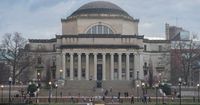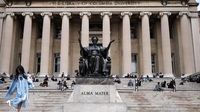On June 4, 2025, the Trump administration escalated its confrontation with Columbia University by formally notifying the Middle States Commission on Higher Education—the independent accrediting body responsible for overseeing the university’s accreditation—that Columbia allegedly violated federal anti-discrimination laws. This notification, issued by the U.S. Department of Education’s Office for Civil Rights, asserts that Columbia failed to protect Jewish students from harassment, particularly in the aftermath of the Hamas terror attacks on Israel in October 2023. This alleged violation means, in the department’s assessment, that Columbia no longer meets the accreditation standards required to maintain eligibility for federal student aid.
Accreditation is critical for universities because it determines whether they can provide students access to federal financial aid programs, including student loans and Pell Grants, which are essential for many students’ ability to attend college. Losing accreditation would be a severe blow to Columbia, as it could block students from receiving federal aid and potentially force them to transfer to other accredited institutions. However, experts caution that the process of revoking accreditation is lengthy and complex, typically involving warnings, probation, and opportunities for institutions to remedy deficiencies before any final adverse action is taken.
U.S. Secretary of Education Linda McMahon emphasized the importance of accreditation bodies in upholding federal civil rights laws. She said, “Accreditors have an enormous public responsibility as gatekeepers of federal student aid. They determine which institutions are eligible for federal student loans and Pell Grants.” McMahon further criticized Columbia’s leadership for what she described as “deliberate indifference towards the harassment of Jewish students on its campus” following the October 7, 2023, Hamas attacks on Israel. She urged the Middle States Commission to keep the Education Department informed of any actions taken to ensure Columbia’s compliance with accreditation standards and federal civil rights laws.
The Middle States Commission on Higher Education confirmed receipt of the department’s letter but declined to comment further. As an independent, nongovernmental organization, Middle States is charged with reviewing such matters and deciding on appropriate actions, which could range from issuing warnings to placing the institution on probation or, in extreme cases, revoking accreditation. Claire McCann, an accreditation expert at American University, noted that Middle States would likely examine the government’s findings and Columbia’s remedial efforts, including the university’s recent policy changes aimed at combating antisemitism.
Columbia University responded to the notification by acknowledging awareness of the concerns and affirming it had addressed them directly with Middle States. A university spokesperson stated, “Columbia is deeply committed to combating antisemitism on our campus. We take this issue seriously and are continuing to work with the federal government to address it.” The university has been under intense scrutiny from the Trump administration, which has accused it of tolerating antisemitism and failing to adequately protect Jewish students during a period marked by student protests related to the Israel-Gaza conflict.
Since the Hamas attacks in October 2023, Columbia has been a focal point of pro-Palestinian and anti-Israel student demonstrations, which have at times escalated into contentious campus confrontations. The Department of Education and the Department of Health and Human Services jointly investigated the university, concluding in May 2025 that Columbia had acted with “deliberate indifference” to harassment faced by Jewish students during these protests. This finding triggered a series of federal actions, including the cancellation of approximately $400 million in federal grants and contracts to Columbia earlier in the year.
In response to federal pressure, Columbia announced sweeping policy reforms in March 2025. These included establishing a new disciplinary committee, launching investigations into students critical of Israel’s military actions in Gaza, and ceding control over its Middle East studies department. Despite these changes, the Trump administration has yet to restore the suspended federal funding, which has caused research disruptions and layoffs at the university.
President Donald Trump has described the accreditation process as his “secret weapon” to enforce ideological changes in higher education institutions. While the federal government does not directly accredit universities, it oversees the private organizations that do, such as Middle States. Trump has frequently criticized accreditors for approving institutions he perceives as failing to provide quality education or adhering to his administration’s ideological standards.
In a related move on the same day, President Trump signed a proclamation restricting the entry of nearly all new Harvard University students using nonimmigrant visas, a further indication of the administration’s aggressive stance toward elite universities it views as problematic.
Experts and education advocates have expressed concern about the politicization of the accreditation process. Ted Mitchell, president of the American Council on Education, described the administration’s actions as “another semi-random attack against a celebrity institution,” suggesting political motivations rather than due process. Antoinette Flores of the think tank New America characterized the Education Department’s letter as a threat not only to Columbia but also to the accrediting body itself, aimed at compelling compliance through federal aid leverage.
Despite the mounting pressure, Columbia’s acting president Claire Shipman emphasized the university’s commitment to maintaining its independence and autonomy. In April 2025, she stated the university would “seek to continue constructive dialogue with the government” but reject any agreement that would require relinquishing institutional autonomy.
Columbia’s accreditation, held since 1921, remains intact for now, with no immediate indication from Middle States that it intends to revoke the status. However, the situation underscores the increasing tensions between the Trump administration and elite academic institutions over issues of antisemitism, free speech, and ideological conformity.
As this complex saga unfolds, Columbia University and its accrediting body face critical decisions that could shape the future of federal oversight in higher education. The stakes are high not only for Columbia’s students and faculty but also for the broader landscape of American academia, where questions about civil rights, academic freedom, and political influence continue to collide.





